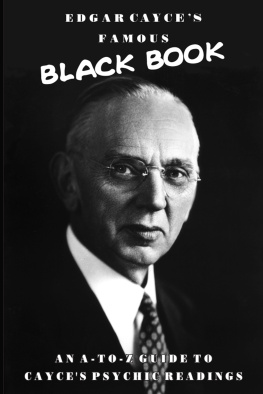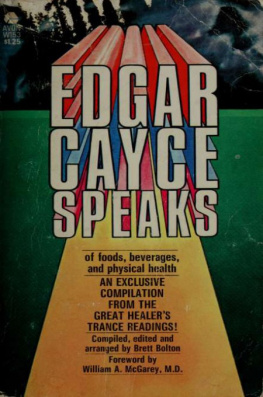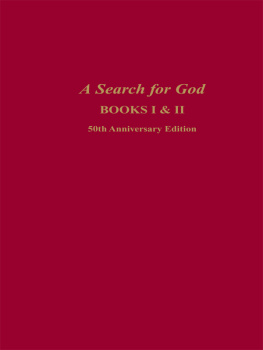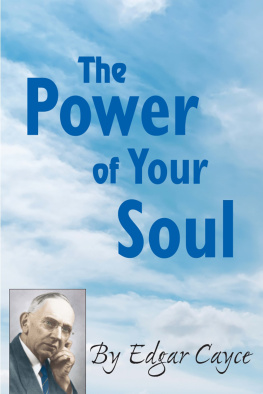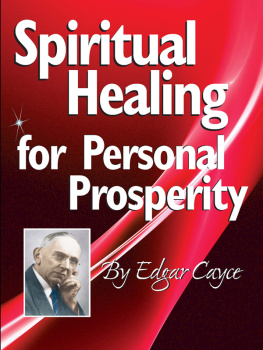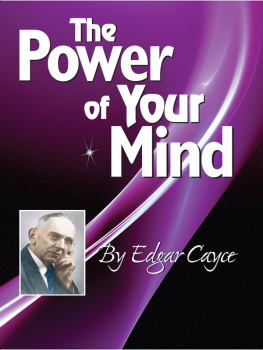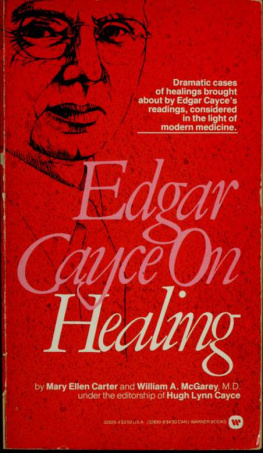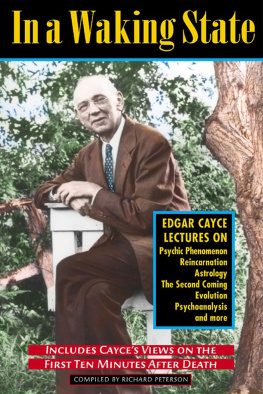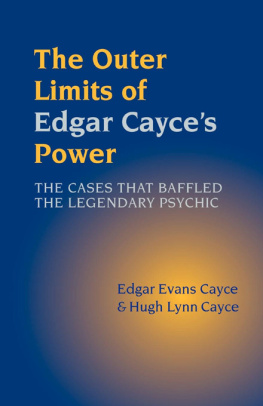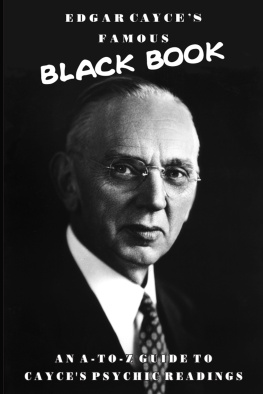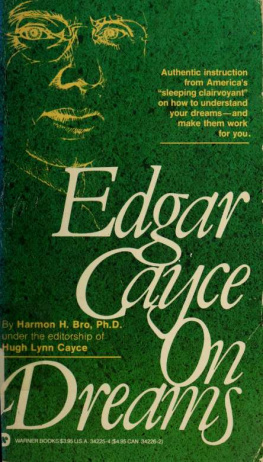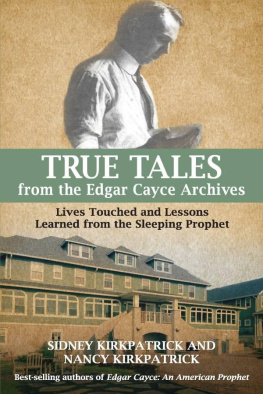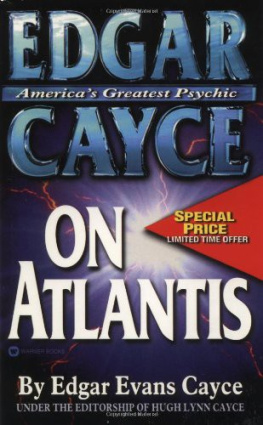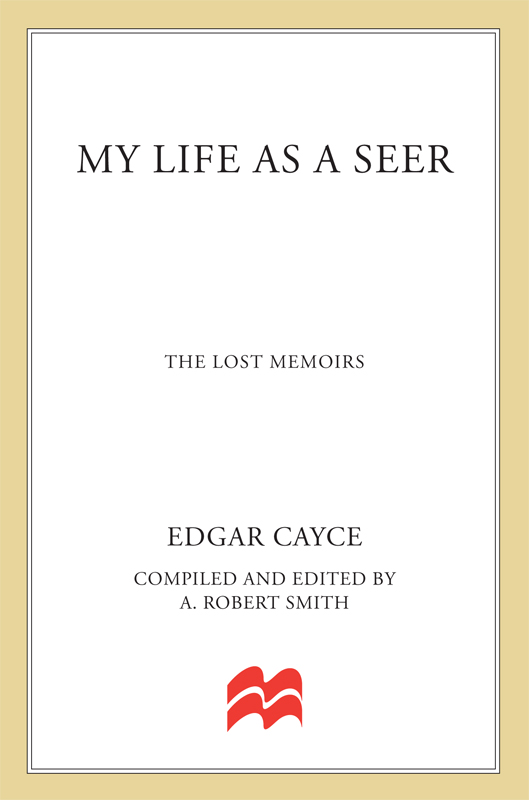
The author and publisher have provided this e-book to you for your personal use only. You may not make this e-book publicly available in any way. Copyright infringement is against the law. If you believe the copy of this e-book you are reading infringes on the authors copyright, please notify the publisher at: us.macmillanusa.com/piracy.
C ONTENTS
It bothered me a great deal as a child that God spoke to the people in the Bible and did not speak to us. Now I believe that He does speak to us, if we will only listen.
Dont ever think that your life isnt being written in the Book of Life. I found it! It is being written. You are the writer!
Gods purpose is that we make ourselves a channel through which His spirit may manifest.
EDGAR CAYCE
A CKNOWLEDGMENTS
This work would never have been undertaken by me had I not been encouraged by Hugh Lynn Cayce to write his biography, Hugh Lynn Cayce: About My Fathers Business, and enjoyed countless Sunday afternoons talking with him about his life with his father. Nor would this book have materialized had Mr. Cayces secretary, Gladys Davis, not acquired the habit of throwing nothing away. She was the original compiler of Mr. Cayces papers who made my research a joy and led me to the priceless documents that inspired this work. I am further indebted and grateful to Charles Thomas Cayce and to his associate, Jeanette Thomas, for facilitating further documentation; to D. D. Cayce, for guiding me all over Christian County, Kentucky, to soak up the scenes of Edgar Cayces youth; to my colleagues John Van Auken, Joe Dunn, Dan Campbell, Susan Lendvay, and Carol Haenni, who contributed insightful editorial recommendations; to Mark Thurston for his enthusiasm for the concept; and to my devoted wife Jane, whose understanding of my preoccupation with this project during intensive months of development allowed me to complete it with a grateful heart. An editor cannot ask for more.
A. Robert Smith
F OREWORD
My grandfather, Edgar Cayce, once said, It is a time in the earth when people everywhere seek to know more of the mysteries of the mind, the soul.
His words have a special ring of clarity today as more and more people are turning inward for answers, applying their own powers of intuition, finding that of God in themselves and their fellow human beings. This is not unique to contemporary times, of course, for every culture throughout history has had its own rare individuals who were gifted beyond the five senses to provide insights for lifes pressing questions. No one has filled this role in the twentieth century quite like Edgar Cayce.
Not only is his psychic gift the most carefully documented, he has been the subject of more literature than anyone in his fieldat last count some 300 books have been published, dealing with various topics covered in his voluminous trance readings. Indeed, the 1996 WorldCat on-line database of 28 million titles of all sorts of publications included 632 titles under the subject Edgar Caycemore than were listed under such well-known intuitives as Mary Baker Eddy, founder of Christian Science (526), or Madame Blavatsky, founder of Theosophy (217). One scholar, K. Paul Johnson, who contributed to this fund of literature with books on both Blavatsky and Cayce, considers the latter a major figure in the spiritual history of the twentieth century.
Edgar Cayces wisdom for our age, as one major publisher heralded a series of books pertaining to his ideas a decade ago, is found in the more than 14,000 discourses that are his principal legacy. These psychic readings, dictated while he lay in a hypnotic trance, constituted his work for more than forty years. Transcriptions of this information have been preserved and disseminated ever since his death in 1945, providing inspiration, metaphysical and philosophical insights, and healing help for countless thousands who have applied his alternative remedies and adopted his holistic health recommendations.
While biographers have recounted events of his upbringing on a Kentucky farm and his rise to fame as a psychic healer, this is the first account of Edgar Cayces life told completely in his own words. He does not dwell on all of the personal aspects of his life, but focuses primarily on those experiences that marked him since childhood as decidedly different from anyone else in his world. In so telling, he reveals how much he yearned to be considered an ordinary boy like everyone else in Hopkinsville, and how he feared for his sanity. Even the Cayce family was divided over Edgar and his strange abilities. But only he can tell this story in all its pathos as he struggles with himself, his family, and with God to discover and come to terms with his destiny.
What saved Edgar Cayce and allowed him to fulfill his souls purpose as the benevolent spiritual philosopher so widely admired today was his enduring faith and the courage to follow his faith as his guidance directed whatever the cost to him personally. His story, then, is a profile in faith no less than courage, and his humility offers a model for all of us as we face our Maker.
Charles Thomas Cayce
President
Edgar Cayce Foundation
Virginia Beach, Virginia
E DITORS P ROLOGUE
Like Edgar Cayce himself, his autobiography is most unconventional and merits an explanation. Unlike the life story of many celebrities, it was not ghostwritten or told to a professional writer but is entirely the work of its subject. Mr. Cayce either typed or dictated to his secretary or told lecture audiences all of the stories that appear in this work. And yet it was not written as a cohesive single narrative or as an autobiography. In that sense it is similar to the autobiography of Mohandas K. Gandhi, The Story of My Experiments with Truth. Gandhi and Cayce were both encouraged to write their own stories, but both men had higher priorities than self-aggrandizement. I agreed to write my autobiography, Gandhi confessed, but I have no spare time. He might have found time, he added, had I gone through my full term of imprisonment [before] I was discharged. He did find time to write a weekly newspaper article, however, and a publisher later compiled them and called it his autobiography.
This book in Edgar Cayces own words follows that pattern. He first wrote an essay about his early mystical encounters in 1926 for a booklet explaining his work and how he came by his unique calling. I have nothing to sell and am seeking only to be of help, he wrote. Not that I expect to write an autobiography of my life, nor do I expect to give in chronological order the various experiences and happenings that have impelled me to arrive at this conclusion, but sufficient that you may have a better understanding, if you are a regular thinker, of why men arrive at certain conclusions. In other words, he could imagine writing about himself only if it would be helpful to someone.
Later, in his mid-fifties, Mr. Cayce did begin dictating his life story to his secretary, Gladys Davis, but never completed the task. He also cooperated with a professional writer, Thomas Sugrue, on a biography, There Is a River. And he went to his typewriter from time to time and wrote anecdotes from his younger days. But it is obvious that he gave first attention to helping others, which he considered his lifes purpose. After his death, at sixty-seven, a few excerpts from his writings were published, but the entire collection was filed away in the archives of the Edgar Cayce Foundation, where I discovered the typescript of what Miss Davis had entitled Edgar Cayces Memoirs. I thought that it, like Schuberts Unfinished Symphony, was too moving not to be shared with the world, unfinished though it may have been.


